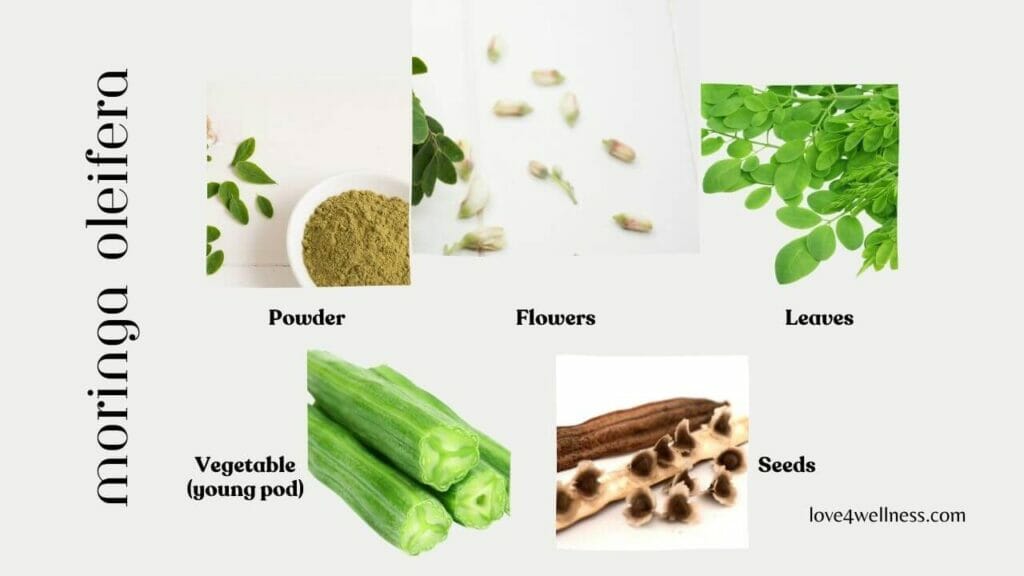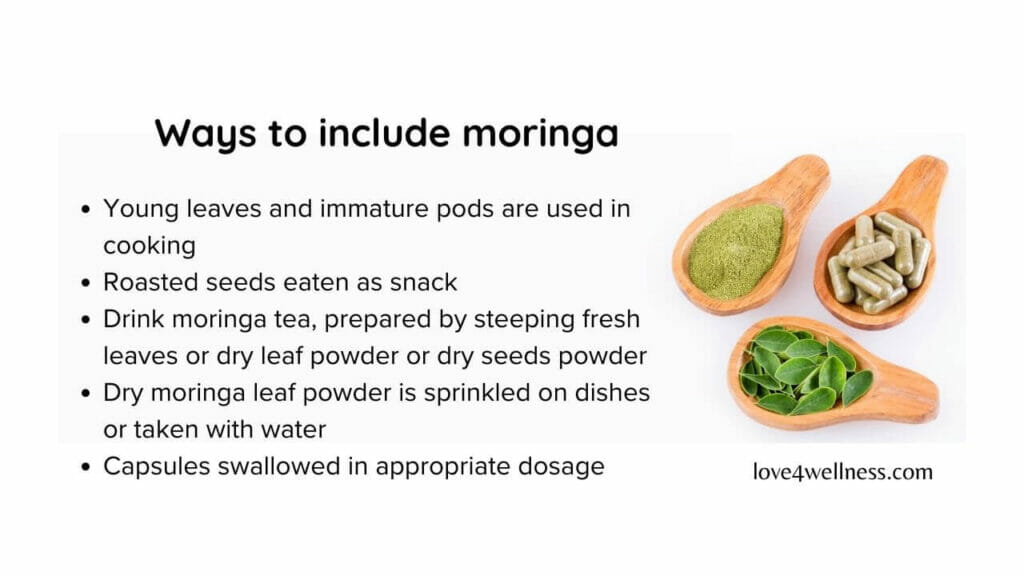Moringa Oleifera is another plant food that humbly possesses plentiful health benefits. Known as the Miracle Tree or Tree of Life, it is native to India but is now grown in tropical and sub-tropical regions worldwide. It is a raging food fad in the West after significant research on the medicinal value of consuming moringa leaves and vegetables. The moringa leaves, seeds, and pods are all edible with great nutritional content and health benefits and are used in cooking and to make supplements in the form of powder and capsules, teas, and oils. In this article, we will explore the health benefits of moringa and how it can improve your overall well-being.
Moringa Oleifera – Nutrients
Moringa is a nutrient-dense plant that is packed with essential vitamins and minerals. It has a whopping number of nutrients – 92 nutrients and 46 antioxidants! Some of the important nutrients in moringa are:
- Protein: Moringa contains high levels of protein, making it an excellent source for vegetarians and vegans.
- Vitamins: A significant source of vitamins A and C, Moringa leaves also contain vitamins E, K and B vitamins such as thiamine, riboflavin, and niacin.
- Minerals: Moringa contains important minerals such as calcium, potassium, iron, zinc, magnesium, phosphorus, and selenium.
- Antioxidants: Moringa is a rich source of antioxidants, including vitamins A, C, and E, as well as compounds such as quercetin, kaempferol, chlorogenic acid, and rhamnazin.
- Omega-3 and Omega-6 fatty acids: Moringa is also a good source of essential fatty acids, including both Omega-3 and Omega-6.
- Fibre: Moringa leaves and seeds are high in fibre, helping to support digestive health and weight management.
- Phytochemicals: Moringa is rich in various phytochemicals, including saponins, tannins, isothiocyanates, flavonoids, and carotenoids, which have been shown to have anti-inflammatory and anti-cancer properties.
However, it is worth noting that moringa contains antinutrients, contributing to the bitterness in leaves. Antinutrients may hinder nutrient absorption in the body, so it is essential to know how to minimise their effects. Cooking, simmering, blanching or roasting moringa before consumption can help reduce the harmful effects of antinutrients, thereby optimising the antioxidant benefits of moringa and vitamin and mineral absorption.
Science-backed health benefits of Moringa
1. Excellent food to boost immunity
In Ayurveda, moringa is a powerful immunity booster. Think of Moringa; it stands out as a superfood because one cup of cooked moringa leaves provides several nutrients, including iron, calcium, potassium, magnesium, and vitamins A, C, E, B6, and riboflavin.
In fact, the leaves provide 7 times more vitamin C than oranges and 15 times more potassium than bananas.
In summary, moringa is super-rich in vitamin C and has minerals zinc, iron, selenium, and phytonutrients, all known to boost immunity.
2. Good source of plant protein containing all nine essential amino acids
Lacking a few essential amino acids is one of the reasons plant-based proteins are looked down upon. Amazingly, moringa leaves contain all nine essential amino acids along with a few of the other 20 amino acids, offering health benefits like muscle repair.
3. Helps manage diabetes
Powerful antioxidants, including quercetin and chlorogenic acid, help lower blood sugar levels and promote insulin release. Studies found that quercetin, kaempferol, and chlorogenic acid in moringa help regulate blood sugar levels, improve insulin sensitivity, and positively impact insulin release, making it a helpful food for type 2 diabetes.
4. May reduce obesity
Studies have found moringa inhibits fat accumulation and improves lipid profile by reducing bad cholesterol levels. Also, antioxidants such as chlorogenic acid improve insulin sensitivity, helping in improved metabolism and burning of calories.
Further, there is a link between gut microbiota and obesity. An imbalance in the gut microbiome increases obesity, and obesity additionally affects gut bacteria. Moringa leaves can restore gut health, helping in weight loss.
5. Reduce arthritis pain and other joints pain
Moringa has anti-inflammatory compounds, including polyphenols and isothiocyanates, that can help alleviate pain, swelling, and redness caused by various conditions. In fact, the anti-inflammatory effects of Moringa on Arthritis make it a promising supplement for reducing inflammation and joint pain.
6. Treats digestive issues
30% of moringa leaves are insoluble fibre, which is great for improving digestion. The antibiotic and antibacterial properties inhibit harmful bacteria in the gut. In addition, the anti-inflammatory properties may improve Inflammatory bowel disease and colitis.
7. Protects heart health
Some studies found that moringa can help reduce blood pressure levels by alleviating vascular dysfunction and decreasing oxidative stress. Antioxidants, including flavonoids, polyphenols, and ascorbic acid, protect the heart against oxidative stress. In addition, anti-inflammatory agents like quercetin reduce inflammation, and beta-sitosterol reduces bad cholesterol. Further, niaziminin relaxes blood vessels and lowers blood pressure. These contribute to improved heart health, reducing risks of heart ailments like heart attack and stroke.
8. May improve your sex life
High cortisol levels can reduce testosterone, which can skew your sex life. Moringa leaves improve testosterone levels and suppress cortisol levels. Hence, it has traditionally and still been used to enhance sex libido.
Furthermore, Ayurveda suggests drumstick flowers and seeds improve sperm count and treat erectile dysfunction.
9. Reduce menopausal symptoms
In menopausal women, the hormones go crazy, disturbing several things, such as insulin release, thyroid hormones, etc.
A study found that postmenopausal women who took moringa leaf powder for three months had increased haemoglobin levels and better blood sugar control. The leaves also improved the thyroid profile in those with hypothyroidism. There were decreased episodes of hot flashes and sleep problems as well.
10. Repairs liver scarring
Fatty liver left unmanaged can start scarring your liver. Since there is no treatment for fatty liver, home remedies and a healthy lifestyle are suggested.
Moringa leaves seem to have hepatoprotective properties due to high concentrations of polyphenols, which can protect and repair damaged liver cells.
11. Age-related neurological conditions
Studies prove that the antioxidant activity in moringa helps in several neurological conditions in older adults. Traditionally, Ayurveda used moringa to treat nervous disorders, including paralysis, nervous debility, and anxiety. Research suggests it can also improve Alzheimer’s, multiple sclerosis, and neuropathic pain.
12. Prevent cancer and helps in cancer treatment
Moringa contains compounds, such as niaziminin and benzyl isothiocyanate, which have anti-cancer properties and may help prevent the growth of cancer cells. Some studies also found that moringa helps improve the cytotoxic effect of chemotherapy on cancer cells.
13. Lowers the risk of many diseases
Antioxidants help prevent damage to your cells from free radicals. Moringa has interesting antioxidant activity with a significant presence of powerful antioxidants such as ascorbic acid, flavonoids, phenolics, and carotenoids. They help lower the risk of several diseases, including heart disease, cancer, diabetes and Alzheimer’s and also prevent eye health and skin health. Studies also show that the antioxidants in moringa leaves have more health benefits, offering photoprotection against oxidative stress caused by UV exposure, thus lowering the risk of skin cancer.
Other uses of Moringa
Moringa has been traditionally used in ancient medicine systems, Ayurveda and TCM, to treat various ailments. Also, households in India have used moringa for centuries regularly in cooking for the wonderful nutritional value it provides.
The list of health benefits is huge; a few of them are:
- Improves absorption of nutrients, preventing malnutrition
- Enhances eye health (Has vitamin A higher than carrots)
- Relieves headaches
- Increase breastmilk production
- Stronger bones (More calcium than in milk)
- Improves lung function, helping in conditions like Asthma
- Cures constipation
- Improves haemoglobin levels
- Reduces skin infections
- Heals wounds
- Gets rid of intestinal parasites
- Beneficial for skin conditions like acne and eczema
Ways to Use Moringa
Moringa’s leaves, pods, and seeds have medicinal value and a huge line-up of health benefits. You may use them in cooking, drink them as tea, or consume them as supplements. Here are some popular ways to incorporate moringa into your daily routine.
In cooking
Moringa leaves can be used in a variety of dishes. They taste slightly bitter and pair well with garlic, onions, and spices. In addition, you can add moringa leaves to soups, stews, and curries for an added nutritional boost.
Tip: Choose immature pods and young leaves for maximum benefits and taste.
As powder
Moringa powder is another popular way to reap its health benefits. You may sprinkle the powder on any dish, including soups, curries, pasta, rice preparations, etc. You can also add the powder to smoothies, juices, and other drinks for an easy and convenient way to benefit from this nutrient-dense plant.
As tea
Moringa tea is a delicious and refreshing way to enjoy the health benefits of moringa. The leaves can be steeped in hot water to make a nutrient-rich tea that can be enjoyed hot or cold.
As supplements
Moringa is available in capsule form, which you may take for health benefits. Take guidance for proper dosage.
As oil
Moringa oil is a valuable ingredient in skincare products due to its moisturising and anti-inflammatory properties. You can use it as a facial oil or moisturiser for dry, cracked skin.
The bottom line
Moringa is not just your ordinary plant – it’s a superhero in disguise! With its science-backed health benefits, moringa can fight inflammation, boost your immune system, regulate your blood sugar levels, and even improve your mood. And the best part? It’s super easy to consume! Whether you prefer it in your diet, tea, powder, or supplement form, moringa is a versatile plant that can easily be incorporated into your daily routine. So why not give your body the superpower it deserves and add moringa to your diet today? With its amazing health benefits and uses, you’ll feel like a superhero in no time!
Images: canva.com


